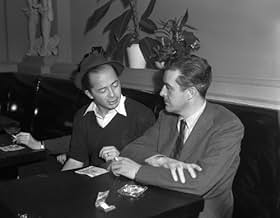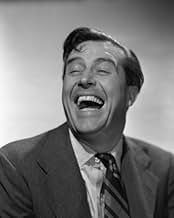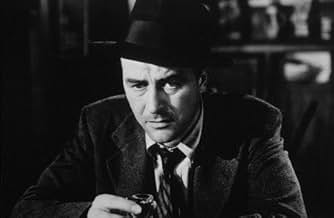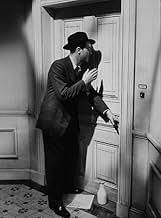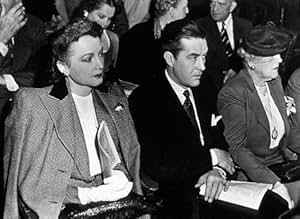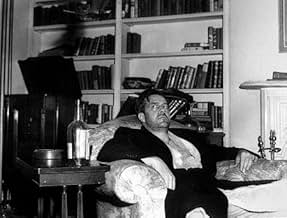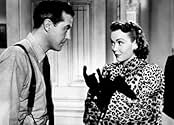The desperate life of a chronic alcoholic is followed through a four-day drinking bout.The desperate life of a chronic alcoholic is followed through a four-day drinking bout.The desperate life of a chronic alcoholic is followed through a four-day drinking bout.
- Director
- Writers
- Stars
- Won 4 Oscars
- 18 wins & 3 nominations total
Anita Sharp-Bolster
- Mrs. Foley
- (as Anita Bolster)
Andy Andrews
- Alcoholic
- (uncredited)
Gene Ashley
- Male Nurse
- (uncredited)
Walter Baldwin
- Man from Albany
- (uncredited)
Harry Barris
- Pianist at Harry & Joe's
- (uncredited)
Ian Begg
- Undetermined Secondary Role
- (uncredited)
Eddie Borden
- Drunk in Alcoholic Ward
- (uncredited)
Jess Lee Brooks
- Hospital Patient
- (uncredited)
- Director
- Writers
- All cast & crew
- Production, box office & more at IMDbPro
Summary
Reviewers say 'The Lost Weekend' is a groundbreaking film with a realistic portrayal of alcoholism. Ray Milland's performance as Don Birnam is praised for its depth. Billy Wilder's direction and the film's visual style, including deep focus and Miklós Rózsa's haunting score, effectively convey addiction's despair. However, some find it melodramatic and repetitive, with an unrealistic ending. Despite criticisms, it is regarded as powerful and influential in cinema.
Featured reviews
As a recovering alcoholic (14 years sober) this remains as the first great film dealing with alcoholism. Ray Milland"s great performance shows realistically the insanity of drinking and the struggles. The promises and hidden bottles will ring true to anyone who has dealt with the problem. Billy Wilder's career was noted for his comedies but he showed in "Lost Weekend" that he knew how to deal with serious matter as well. The ending shot is a classic and will be memorable for anyone seeing the film. Check out "Days of Wine & Roses" as well.
... and not get tired of it. Ray Milland's performance is riveting and, if you are watching for the first time, the first scene will do nothing but raise questions, getting you involved. How did Don (Ray Milland) get to be such an alcoholic? Why does his brother have a right to say how he lives? What does he do for a living? Why does such a seemingly together woman like Helen (Jane Wyman) stay with this guy for three years? All of these questions get answered slowly as the movie unravels over one long weekend that Don was supposed to spend in the country with his brother, but instead spends alone, but thanks to ten dollars that Don's brother left behind, he does not spend it completely alone - he's got money to buy booze.
And yet Don doesn't plan ahead. He thinks enough to cover up the two bottles he buys at the liquor store with some apples that he buys to put up on top of the bag as he walks home so neighbors cannot see the booze, but the urgency doesn't come until he is completely out of liquor and out of the ten bucks to get more. And he is willing to do ANYTHING to get that liquor - he'll pretend to be interested in a girl in a local bar who is obviously crazy about him in order to get a few bucks, he tries to trade his typewriter (he's a failed writer) to a local bar owner for a drink, he steals money from a woman's purse in a nightclub to get booze, he even stages a faux hold-up (he has no gun) to get a bottle from a liquor store.
And that's it for the entire movie - Don Birnham and his quest for the next bottle eats all of his time and energy. Other characters are just instruments in that quest or are in the form of flashbacks to tell you how Don got to where he was in the first scene. And then there's that haunting score that runs the length of the film. Everything is brutal realism UNTIL the last scene. Maybe it was the censors, but today it could have cost the film some Oscars.
A couple of questions never raised. How did Don's brother Wick manage to support himself AND Don all of these years IN New York City? Didn't Wick ever long for a life and family of his own? There's got to be a limit to anybody's patience and charity, even if they are kin. Another question from an old film buff like me - Isn't it odd how the Great Depression and World War II magically disappear from sight in the past that Don is recollecting. 15 years of American history that effected everybody seems to have no place in Don's story. To look at this film, this shiny bustling post-war world has always been there. This is the turn of film from Depression and world war - collective struggles - back to the struggle of the individual with himself, the beginning of noir.
And yet Don doesn't plan ahead. He thinks enough to cover up the two bottles he buys at the liquor store with some apples that he buys to put up on top of the bag as he walks home so neighbors cannot see the booze, but the urgency doesn't come until he is completely out of liquor and out of the ten bucks to get more. And he is willing to do ANYTHING to get that liquor - he'll pretend to be interested in a girl in a local bar who is obviously crazy about him in order to get a few bucks, he tries to trade his typewriter (he's a failed writer) to a local bar owner for a drink, he steals money from a woman's purse in a nightclub to get booze, he even stages a faux hold-up (he has no gun) to get a bottle from a liquor store.
And that's it for the entire movie - Don Birnham and his quest for the next bottle eats all of his time and energy. Other characters are just instruments in that quest or are in the form of flashbacks to tell you how Don got to where he was in the first scene. And then there's that haunting score that runs the length of the film. Everything is brutal realism UNTIL the last scene. Maybe it was the censors, but today it could have cost the film some Oscars.
A couple of questions never raised. How did Don's brother Wick manage to support himself AND Don all of these years IN New York City? Didn't Wick ever long for a life and family of his own? There's got to be a limit to anybody's patience and charity, even if they are kin. Another question from an old film buff like me - Isn't it odd how the Great Depression and World War II magically disappear from sight in the past that Don is recollecting. 15 years of American history that effected everybody seems to have no place in Don's story. To look at this film, this shiny bustling post-war world has always been there. This is the turn of film from Depression and world war - collective struggles - back to the struggle of the individual with himself, the beginning of noir.
10jotix100
The American cinema can count itself lucky with the wave of arrival of the best European talent in the days prior to World War II. Among the most distinguished directors that came to Hollywood was Billy Wilder who left a legacy, not only as a director, but in the many screen plays he wrote. One of his great works was "The Lost Week-end". Written with Charles Brackett, one of his most frequent collaborators, this is a film that dared to talk about a thing that no one dared to speak before: alcoholism.
If you haven't seen the film, please stop reading now.
On the opening scene of the picture we watch Don Birman, and his brother Wick packing suitcases for a long weekend in the country. We realize not everything is all right as we watch a bottle tied with a piece of string hanging out of a window. It's clear to see what was wrong with that picture, Don is an alcoholic! Wick, having enough common sense, wants to keep his brother near him, in order to control the situation.
Things get complicated with the arrival of Helen, the woman in love with Don. Helen St. James has been in a relationship with Don that has gone nowhere because of his drinking problem. Helen, as well as Wick, don't have the courage to have him committed to have him cured of his addiction. In fact, both are to blame about the condition affecting Don, but neither realize how deep is the problem.
In 1945 themes involving addiction were never told to the movie going public. Alcoholism was a vice that affected a lot of people in the country, but those were the days where people with drinking problems stayed in the closet, not daring to recognize how their lives were being ruined by the heavy use of alcohol.
We watch in horror as Don spends a weekend in hell going from one scheme to the next trying to get money to support his nasty habit. We also see Don Birman experience the worst night of his life when he is taken to a hospital, after falling down from a staircase. There, he sees first hand the horrors his addictions will bring to him. In a way, the exposure to the men in the hospital is a wake up call for Don, who decides to end it all because drinking has taken over his life. The movie should be seen by anyone suffering from this terrible social disease.
Ray Milland transforms himself into this troubled man. He gives an incredible performance. Mr. Milland has to be given credit in undertaking the portrayal of this lost soul in such a convincing fashion. By Hollywood standards, Ray Milland, an actor better known for his work in comedies, transforms himself into this Don Birman.
The supporting cast was excellent as well. Jane Wyman as Helen St. James is seen in one of her better roles of her career. Phillip Terry, as Wick, the kind brother is also good. Howard DaSilva, the bartender Nat, makes an impressive appearance in the film. Doris Dowling, as Gloria the friendly prostitute is equally effective.
Of course, this is a movie that shows Billy Wilder at his best. By filming on location in Manhattan, a rich texture is added. From Nat's bar we can watch the trams that circulated on Third Ave. at that time, as well as the 3rd. Av. El. The excellent black and white cinematography of John Seitz looks as good today, as it must have looked in 1945, when the film was released. The music score by the great Milos Rozsa is haunting without being too obvious.
This is, without a doubt, one of Billy Wilder's best movies, one that endures the passing of time. Mr. Wilder dared to speak out loud about something no one wanted to talk about.
If you haven't seen the film, please stop reading now.
On the opening scene of the picture we watch Don Birman, and his brother Wick packing suitcases for a long weekend in the country. We realize not everything is all right as we watch a bottle tied with a piece of string hanging out of a window. It's clear to see what was wrong with that picture, Don is an alcoholic! Wick, having enough common sense, wants to keep his brother near him, in order to control the situation.
Things get complicated with the arrival of Helen, the woman in love with Don. Helen St. James has been in a relationship with Don that has gone nowhere because of his drinking problem. Helen, as well as Wick, don't have the courage to have him committed to have him cured of his addiction. In fact, both are to blame about the condition affecting Don, but neither realize how deep is the problem.
In 1945 themes involving addiction were never told to the movie going public. Alcoholism was a vice that affected a lot of people in the country, but those were the days where people with drinking problems stayed in the closet, not daring to recognize how their lives were being ruined by the heavy use of alcohol.
We watch in horror as Don spends a weekend in hell going from one scheme to the next trying to get money to support his nasty habit. We also see Don Birman experience the worst night of his life when he is taken to a hospital, after falling down from a staircase. There, he sees first hand the horrors his addictions will bring to him. In a way, the exposure to the men in the hospital is a wake up call for Don, who decides to end it all because drinking has taken over his life. The movie should be seen by anyone suffering from this terrible social disease.
Ray Milland transforms himself into this troubled man. He gives an incredible performance. Mr. Milland has to be given credit in undertaking the portrayal of this lost soul in such a convincing fashion. By Hollywood standards, Ray Milland, an actor better known for his work in comedies, transforms himself into this Don Birman.
The supporting cast was excellent as well. Jane Wyman as Helen St. James is seen in one of her better roles of her career. Phillip Terry, as Wick, the kind brother is also good. Howard DaSilva, the bartender Nat, makes an impressive appearance in the film. Doris Dowling, as Gloria the friendly prostitute is equally effective.
Of course, this is a movie that shows Billy Wilder at his best. By filming on location in Manhattan, a rich texture is added. From Nat's bar we can watch the trams that circulated on Third Ave. at that time, as well as the 3rd. Av. El. The excellent black and white cinematography of John Seitz looks as good today, as it must have looked in 1945, when the film was released. The music score by the great Milos Rozsa is haunting without being too obvious.
This is, without a doubt, one of Billy Wilder's best movies, one that endures the passing of time. Mr. Wilder dared to speak out loud about something no one wanted to talk about.
The often stated belief that alcoholism is a mere bodily addiction does not do the truth any justice. Alcoholism is more. It's a state of mind. It's addictive escapism for those who feel cheated by life, a way of avoiding fears and unhappiness, an illusionary method to make up for ones failures. Maybe that's why most therapies do not succeed. They solely concentrate on the illness, rather than on the cause of it. Of course, in many cases the cause cannot be helped...
In The Lost Weekend we accompany the failed writer Don Birnam (Ray Milland) surrendering to the self-destructive nature of his addiction. Despite being good-looking and intelligent, Don is a hopeless alcoholic filled with self-loathing ("The reason is me. What I am. Or rather what I am not.") The brand doesn't matter, the cheaper the better to him it's all the same. Drinking seems to be his only way to escape from his misery and low self-esteem. "Suddenly I'm above the ordinary. I'm competent. I'm walking a tightrope over Niagara Falls. I'm one of the great ones. I'm Michaelangelo, molding the beard of Moses. I'm Van Gogh painting pure sunlight. [...]" That's what a drunk Don tells his favourite barkeeper Nat (Howard Da Silva).
Yet, in one aspect he is lucky. Unlike many of his fellow sufferers he is not alone. After years of abuse, his faithful girlfriend Helen (Jane Wyman) and his brother Wick (Phillip Terry) have still not deserted him. Compassionately they do their utmost to protect Don from himself by keeping him under close observation. With great effort they determined the most inventive hiding-places of his bottles and they even visited nearby liquor stores and bars, begging not to accept Don as a customer. There is nothing they haven't tried, but Don appears to be beyond salvation ("I am not a drinker. I'm a drunk." he tells them.). Just before the three of them are about to go on a weekend trip, Don devises a cunning plan to temporarily get rid of the two persons who care about him, giving him time to acquire the liquid he treasures the most. Soon he is stone drunk, staggering through the streets, always on the lookout for the next drink. For Don there will be no weekend trip. Only the bottle and the desperate humiliations connected with attaining it.
The Lost Weekend is a a drama of great emotional vehemence, lacking the light heartedness of Billy Wilder's later works. It gives unclouded insight into the darkest corners of alcoholism and depicts the powerlessness of the alcoholic over himself. Wilder created great controversy at that time by letting the lead actor succumb to his addiction. He didn't shy away from showing the addict's humiliations when begging for money or booze. Neither did he hesitate to point out the addict's loss of all self-respect when stealing and lying to pay for his one need. The horrifying hallucination scene only adds up to the disturbing decline of Don Birnam's humanity, proving that the greatest horrors lie within our imagination.
This is an excellent film of lasting relevance. It is technically brilliant and shines with great dialogue (which is typical for Wilder). Its storytelling (flashbacks) is superior. Furthermore Ray Millard (Dial M for Murder) gives a terrific and equally courageous performance as the the self-destructive alcoholic. You can see the desperate self-loathing and calculating slyness of a true addict written on his face.
In the end it comes down to two choices. Don can give in to alcoholism and thereby give up on life. Or he can try to overcome his addiction and face his fears and discontentment. Although sheer will-power may not be enough to achieve the latter, it is essential for succeeding. And the cause isn't lost, for there is Helen to help and care for him. Don is not alone. May someone have mercy on those who are...
In The Lost Weekend we accompany the failed writer Don Birnam (Ray Milland) surrendering to the self-destructive nature of his addiction. Despite being good-looking and intelligent, Don is a hopeless alcoholic filled with self-loathing ("The reason is me. What I am. Or rather what I am not.") The brand doesn't matter, the cheaper the better to him it's all the same. Drinking seems to be his only way to escape from his misery and low self-esteem. "Suddenly I'm above the ordinary. I'm competent. I'm walking a tightrope over Niagara Falls. I'm one of the great ones. I'm Michaelangelo, molding the beard of Moses. I'm Van Gogh painting pure sunlight. [...]" That's what a drunk Don tells his favourite barkeeper Nat (Howard Da Silva).
Yet, in one aspect he is lucky. Unlike many of his fellow sufferers he is not alone. After years of abuse, his faithful girlfriend Helen (Jane Wyman) and his brother Wick (Phillip Terry) have still not deserted him. Compassionately they do their utmost to protect Don from himself by keeping him under close observation. With great effort they determined the most inventive hiding-places of his bottles and they even visited nearby liquor stores and bars, begging not to accept Don as a customer. There is nothing they haven't tried, but Don appears to be beyond salvation ("I am not a drinker. I'm a drunk." he tells them.). Just before the three of them are about to go on a weekend trip, Don devises a cunning plan to temporarily get rid of the two persons who care about him, giving him time to acquire the liquid he treasures the most. Soon he is stone drunk, staggering through the streets, always on the lookout for the next drink. For Don there will be no weekend trip. Only the bottle and the desperate humiliations connected with attaining it.
The Lost Weekend is a a drama of great emotional vehemence, lacking the light heartedness of Billy Wilder's later works. It gives unclouded insight into the darkest corners of alcoholism and depicts the powerlessness of the alcoholic over himself. Wilder created great controversy at that time by letting the lead actor succumb to his addiction. He didn't shy away from showing the addict's humiliations when begging for money or booze. Neither did he hesitate to point out the addict's loss of all self-respect when stealing and lying to pay for his one need. The horrifying hallucination scene only adds up to the disturbing decline of Don Birnam's humanity, proving that the greatest horrors lie within our imagination.
This is an excellent film of lasting relevance. It is technically brilliant and shines with great dialogue (which is typical for Wilder). Its storytelling (flashbacks) is superior. Furthermore Ray Millard (Dial M for Murder) gives a terrific and equally courageous performance as the the self-destructive alcoholic. You can see the desperate self-loathing and calculating slyness of a true addict written on his face.
In the end it comes down to two choices. Don can give in to alcoholism and thereby give up on life. Or he can try to overcome his addiction and face his fears and discontentment. Although sheer will-power may not be enough to achieve the latter, it is essential for succeeding. And the cause isn't lost, for there is Helen to help and care for him. Don is not alone. May someone have mercy on those who are...
Uncompromising, dark and definitely disturbing Best Picture Oscar winner from 1945 that deals with a writer's (Ray Milland in one of the very best performances ever shown on the silver which deservedly landed him his only Oscar) alcoholism and the effects that his problem has on himself, his work and those closest to him. The love of his life (Jane Wyman) and his very supportive brother (Phillip Terry) try to save Milland from a habit that has gotten terribly out-of-hand. Heart-wrenching flashbacks into Milland's demise are sometimes difficult sequences to get through. In the end it is not a sure thing if Milland can distance himself from his disease and return to a normal life. Billy Wilder's uncompromising direction and screenplay yielded him Oscars in this film that scared many studios away in the early-1940s due to its intense subject matter and the question of whether the film could create interest. Made during a time when patriotic movies and romantic comedic farces dominated the cinema, "The Lost Weekend" was truly unlike anything ever experienced before. A very well-made production that is first class all the way. A real classic in every sense of the term. 5 stars out of 5.
Oscars Best Picture Winners, Ranked
Oscars Best Picture Winners, Ranked
See the complete list of Oscars Best Picture winners, ranked by IMDb ratings.
Storyline
Did you know
- TriviaBilly Wilder claimed the liquor industry offered Paramount Pictures $5 million not to release the film; he also suggested that he would have accepted had they offered it to him personally.
- GoofsWhen the waiter gives Don the check at Harry & Joe's and he reaches for it, the glass, ashtray, napkin, and cigarette all change position between camera shots.
- Quotes
[Nat moves to wipe away the circle of whisky from Don Birnam's glass]
Don Birnam: Don't wipe it away, Nat. Let me have my little vicious circle. You know, the circle is the perfect geometric figure. No end, no beginning.
- ConnectionsEdited into Dead Men Don't Wear Plaid (1982)
- SoundtracksLa Traviata
(1853) (uncredited)
Music by Giuseppe Verdi
Libretto by Francesco Maria Piave
Libiamo ne' lieti calici (Drinking Song) Performed by John Garris and Theodora Lynch with The San Francisco Opera Company
Details
Box office
- Budget
- $1,250,000 (estimated)
- Gross worldwide
- $813
- Runtime1 hour 41 minutes
- Color
- Aspect ratio
- 1.37 : 1
Contribute to this page
Suggest an edit or add missing content



